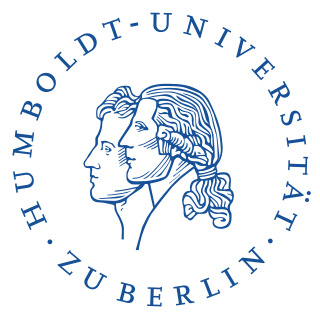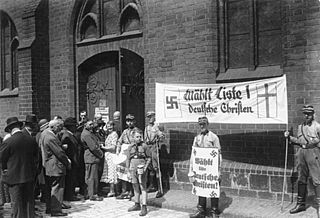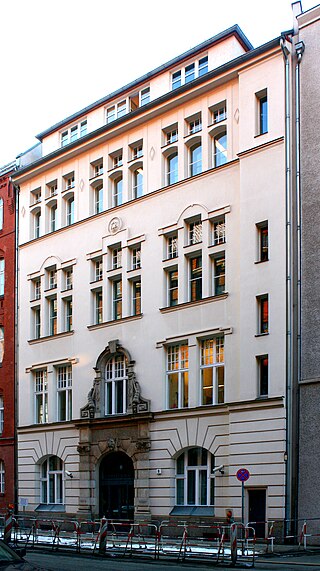External links
- Bibliotheksgebäude Teltower Damm 118 Denkmalamt
The Kirchliche Hochschule Berlin (Church University Berlin) was a theological university in Berlin, Germany, from 1945 to 1992, a facility of the Protestant Church in Berlin, Brandenburg and Silesian Upper Lusatia.
The university dates back to 1935, when a Kirchliche Hochschule für reformatorische Theologie, Abteilung Dahlem (Church university for reformed theology, Dahlem) was founded, following the model of the Kirchliche Hochschule Wuppertal in Elberfeld by Hans Asmussen. The Berlin institution was founded by Martin Niemöller of the Confessing Church, after many theological faculties at state universities had been closed by the Nazi government, especially the Bonn faculty with Karl Barth.
The Kirchliche Hochschule Dahlem was banned by the Nazis in the year of its founding, but was run until 1941 illegally in Berlin-Zehlendorf. After World War II, the institution was reopened.
Professors of the Confessing Church included Hans Asmussen, Martin Albertz, Edo Osterloh , Franz Hildebrandt, Wilhelm Niesel . Among the alumni were Joachim Günther and Werner H. Schmidt .
The Confessing Church was a movement within German Protestantism during Nazi Germany that arose in opposition to government-sponsored efforts to unify all Protestant churches into a single pro-Nazi German Evangelical Church.

The Humboldt University of Berlin is a public research university in the central borough of Mitte in Berlin, Germany

German Christians were a pressure group and a movement within the German Evangelical Church that existed between 1932 and 1945, aligned towards the antisemitic, racist and Führerprinzip ideological principles of Nazism with the goal to align German Protestantism as a whole towards those principles. Their advocacy of these principles led to a schism within 23 of the initially 28 regional church bodies (Landeskirchen) in Germany and the attendant foundation of the opposing Confessing Church in 1934. Theologians Karl Barth and Dietrich Bonhoeffer drafted the Barmen Declaration the same year opposing Nazi doctrines.

The German Evangelical Church was a successor to the German Evangelical Church Confederation from 1933 until 1945.

Helmut Gollwitzer was a German Protestant (Lutheran) theologian and author.

The Prussian Union of Churches was a major Protestant church body which emerged in 1817 from a series of decrees by Frederick William III of Prussia that united both Lutheran and Reformed denominations in Prussia. Although not the first of its kind, the Prussian Union was the first to occur in a major German state.

Hermann Otto Erich Sasse was a German Lutheran pastor, theologian, and author. He was considered one of the foremost confessional Lutheran theologians of the 20th century.

Hochschule für die Wissenschaft des Judentums, or Higher Institute for Jewish Studies, was a rabbinical seminary established in Berlin in 1872 and closed down by the Nazi government of Germany in 1942. Upon the order of the government, the name was officially changed to Lehranstalt für die Wissenschaft des Judentums.

Dahlem is a locality of the Steglitz-Zehlendorf borough in southwestern Berlin. Until Berlin's 2001 administrative reform it was a part of the former borough of Zehlendorf. It is located between the mansion settlements of Grunewald and Lichterfelde West.

Kurt Aland was a German theologian and biblical scholar who specialized in New Testament textual criticism. He founded the Institut für neutestamentliche Textforschung in Münster and served as its first director from 1959 to 1983. He was one of the principal editors of Nestle–Aland – Novum Testamentum Graece for the Deutsche Bibelgesellschaft and The Greek New Testament for the United Bible Societies.
The Deutsche Hochschule für Politik (DHfP), or German Academy for Politics, was a private academy in Berlin, founded in October 1920. It was integrated into the Faculty for Foreign Studies of the Friedrich-Wilhelms-Universität in 1940, was re-founded in 1948 and turned into the Otto-Suhr-Institut of the Freie Universität Berlin in 1959.
Eberhard Jüngel was a German Lutheran theologian. He was Emeritus Professor of Systematic Theology and the Philosophy of Religion at the Faculty of Protestant Theology of the University of Tübingen.
The Ernst Busch Academy of Dramatic Arts, based in the Niederschöneweide district of Berlin, Germany, was founded in 1951 as the National Theatre School in Berlin with the status of college. In 1981, it was granted university status, and a year later it was renamed after the singer and East German actor Ernst Busch.

Hans Christian Asmussen was a German Evangelical and Lutheran theologian.

Elisabeth Schiemann was a German geneticist, crop researcher and resistance fighter in the Third Reich.
Heinrich Vogel was an evangelical theologian, poet of sacred texts and songs and composer of numerous motets and chamber music. He studied theology at the University of Berlin and the University of Jena. In 1927 he became a minister for the Evangelical Church of the old-Prussian Union in Oderberg.
Werner Koch was a German pastor, evangelical-reformist theologian and journalist. Through his early involvement with the Confessing Church he came to wider prominence as an opponent of the Nazi government, spending time in Sachsenhausen concentration camp.
Matthias Klinghardt is a German Protestant theologian and university professor. His theological specialty is the New Testament. He is known as a revisionist historian of Eucharistic origins and as a proponent of the Marcion hypothesis for the synoptic problem and the gospel of John.

Hildegard Schaeder was a German theologian and church historian. In her research, she focused on the history and theology of Eastern orthodox churches, with studies not only in Breslau and Hamburg but also in Prague and the Soviet Union where she lived when the Nazis came to power.
Friedrich Smend was a German Protestant theologian and librarian at the Preußische Staatsbibliothek in Berlin, publishing a catalogue of the writings of Adolf von Harnack. He was a liturgist, teaching as professor at the Kirchliche Hochschule Berlin. His publications focus on the work of Johann Sebastian Bach and Johann Wolfgang von Goethe.